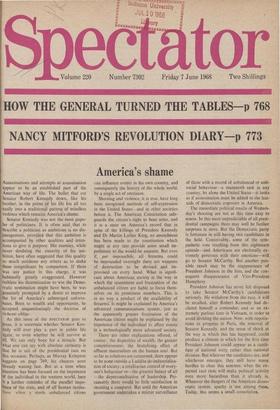America's shame
Assassinations and attempts at assassination appear to be an established part of the American way of life. The bullet that cut Senator Robert Kennedy down, like his brother, in the prime of his life fits all too easily into a traditional pattern of mindless violence which remains America's shame.
Senator Kennedy was not the most popu- lar of politicians. It is often said that to describe a politician as ambitious is no dis- paragement, provided that this ambition is accompanied by other qualities and inten- tions to give it purpose. His enemies, while never doubting the sincerity of his am- bition, have often suggested that this quality so much outshone any others as to make them insignificant by comparison. If there was any justice in this charge, it was habitually greatly exaggerated. However ruthless his determination to win the Demo- cratic nomination might have been, he was genuinely prompted by a desire to improve the lot of America's submerged unfortu- nates. Born to wealth and opportunity, he accepted unquestioningly the doctrine of ichesse oblige.
As this issue of the SPECTATOR goes to ress, it is uncertain whether Senator Ken- edy will ever play a part in public life again; or even whether he will survive at all. We can only hope for a miracle. But What one can say with absolute certainty is that he is out of the presidential race on this occasion. Perhaps, as Murray Kempton aggests on page 769, his chances were lready waning fast. But at a time when ttention has been focused on the impotence f the individual in the western world, here t'41 a further reminder of the parallel impo- Oence of the state, and of all human institu- rtions when a single unbalanced citizen can influence events in his own country, and consequently the history of the whole world, by a single act of unreason.
Shooting and violence, it is true, have long been recognised methods of self-expression in the United States—and in other societies before it. The American Constitution safe- guards the citizen's right to bear arms, and it is a stain on America's record that in spite of the killings of President Kennedy and Dr Martin Luther King, no amendment has been made to the constitution which might at any rate provide some small im- pediment to the would-be assassin. But even if, per impossibile, all firearms could be impounded overnight there are weapons of destruction to be devised and im- provised on every hand. What is signifi- cant about American society is the way in which the resentment and frustration of the unbalanced citizen are liable to focus them- selves on its prominent members. This is in no way a product of the availability of firearms. It might be explained by America's advanced communications system, just as the apparently greater frustration of the American citizen might be explained by the impotence of the individual to affect events in a technologically more advanced society.
There are other explanations offered, of course: the disparities of wealth; the greater competitiveness: the brutalising effect of affluent materialism on the human soul. But so far as solutions are concerned, there appear to be none outside a Luddite de-industrialisa- tion of society; a totalitarian control of every- one's behaviour or—the greatest lunacy of all —the depersonalisation of leadership. Pre- sumably there would be little satisfaction in shooting a computer. But until the American government undertakes a stricter surveillance of those with a record of unbalanced or anti- social behaviour—a mammoth task in any country, let alone the United States—it looks as if assassination must be added to the haz- ards of democratic exposure in America.
The immediate political results of Wednes- day's shooting are not at this time easy to assess. In this most unpredictable of all presi- dential campaigns there may well be further surprises in store. But the Democratic party is fortunate in still having two candidates in the field. Conceivably, some of the sym- pathetic vote resulting from this nightmare episode—and Americans are electorally ex- tremely generous with their emotions—will go to Senator McCarthy. BM another pos- sible result may be the reappearance of President Johnson in the lists, and the con- sequent disappearance of Vice-President Humphrey.
President Johnson has never felt disposed to take Senator McCarthy's candidature seriously. He withdrew from the race. it will be recalled, after Robert Kennedy had de- clared himself a contender, and at an ex- tremely parlous time in Vietnam, in order to avoid dividing the nation. Now, with negotia- tions in progress in Paris, the removal of Senator Kennedy, and the sense of shock at the way in which this has happened, could produce a climate in which for the first time President Johnson could appear as a candi- date of national unity rather than national division. But whoever the candidates are, and whichever emerges, they still have many hurdles to clear this summer, when the ex- pected race riots will make political activity even more hazardous than it already is. Whatever the dangers of the American demo- cratic system, apathy is not among them. Today, this seems a small consolation.






































